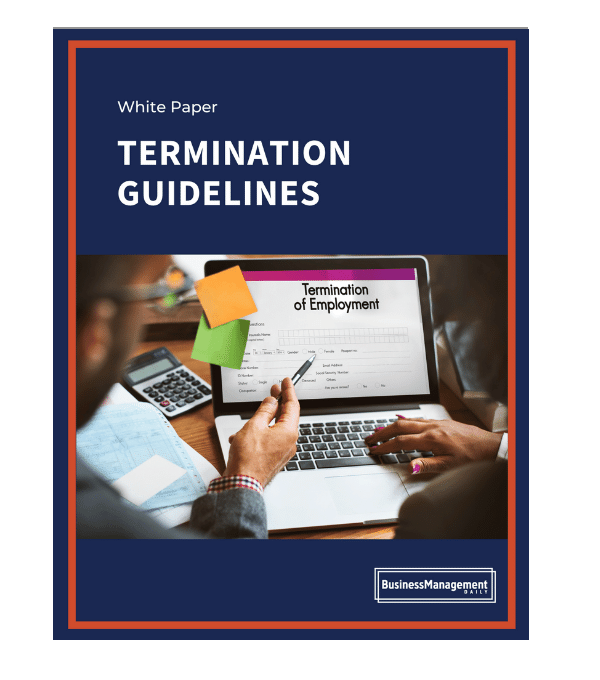Comply with employment laws & reduce liability
It’s your responsibility to fire underperforming employees so your organization can thrive. It is simply a necessary part of your job. Yet even if you’ve documented poor performance and given verbal and written warnings, you may still be hesitant to fire the chronically absent worker, the employee abusing FMLA, the disabled worker whose accommodations just aren’t working, or the one who simply isn’t measuring up.
You know that firing anyone — no matter the circumstances or scenario — puts you at severe risk of being sued. Sometimes, that non-performing employee has already begun setting up a lawsuit by filing complaint after complaint; even if you’ve done your due diligence and investigated each, you’re still at risk for a retaliation claim.
Do you know how to prepare for a reduction-in-force without inadvertently triggering lawsuits based on protected categories like age, race, or sex? How do you slice and dice selection criteria without creating a disparate impact on a group of workers? If you plan to rely on severance payments to stop potential litigation, you must follow very specific rules for releases. And what about the WARN Act? How much notice do you have to give — or can you buy your way around it with automatic severance payments?
Finally, do you know the step-by-step way to carry out a termination? When is the best time? Must it happen in person? And whether by phone, Zoom, or in a conference room, how many witnesses from your company should attend? Learn answers to all these questions and more so you can confidently fire those who need to go without risking a runaway jury award, protracted litigation, or enforcement agency attention.
Agenda
You know that firing anyone — no matter the circumstances or scenario — puts you at severe risk of being sued.

Planning for termination from the start
-
- Understanding at-will status
- Setting expectations with probation, interim reviews, and clear goals
- Handling early accommodation requests and ensuring follow-up
- The case for progressive discipline and performance improvement plans

Disciplinary and performance failure terminations
-
- Training managers and supervisors on how to implement your disciplinary system for maximum effectiveness, including delivering performance reviews that set clear expectations
- Writing up discipline so you include essential information in enough detail to withstand court scrutiny
- Tracking declining performance and absenteeism through a performance improvement plan with patience, specificity, and clear timelines
- Handling personality conflicts, threats, and disruptive behavior
- Managing the termination meeting

Terminating workers on FMLA, ADA, PWFA and religious reasonable accommodations
-
- When you can and can’t discipline workers taking FMLA
- The unique abuse problems of FMLA intermittent leave
- Managing ADA accommodations that aren’t working
- How far you must go to accommodate sincerely held religious and ethical beliefs before termination
- Your obligations under the PWFA, including when you can and can’t send home a worker who can’t perform essential job functions

Reductions in force, reorganizations, and mass layoffs
-
- Planning the reduction in force and reorganization
- Factors you can and cannot use when creating the layoff list
- How to create enforceable severance packages that include a promise not to sue
- The Older Workers Benefit Protection Act (OWBPA) and Worker Adjustment and Retraining Notification Act (WARN) rules you must follow
Workshop Instructor

Anniken Davenport is an attorney and a well-known author and speaker on employment law issues. She is the editor of the HR Specialist: Employment Law newsletter series and has authored several books, including The FMLA Compliance Guide, Bullet-Proof Your Employee Handbook and the Employer’s Practical Legal Guide. She is the co-author of Labor & Employment Law for the 21st Century by Prentice Hall. Anniken has served as a professor at Penn State University, where she taught business law and HR management, and she directed the Legal Studies Program at Wilson College.

Direct Access to Your Instructor
Every disciplinary or termination scenario is different. Bring your specific questions to ask the expert during the dedicated Q&A session.
“The seminars with Anniken Davenport are supportive to the needs of our organization. She is prepared, knowledgeable and current with topics we need now.”
“It was such a ‘meaty’ seminar and I enjoyed it. Anniken is interesting and I enjoy all of her presentations.”
“I always appreciate Anniken's presentations.”
Registration bonuses

Termination Guidelines white paper
You’ll learn about issues such as exercising your right to fire at will, laying the groundwork with progressive discipline, avoiding wrongful termination lawsuits, preventing constructive discharge claims, conducting termination meetings and exit interviews, and handling layoffs with care.

Terminations Flowcharts
Use these step-by-step flowcharts to map your course for various types of terminations. Master the process for different terminations to ensure compliance at each step.
![]()

Satisfaction Guaranteed
If the Legal Terminations Workshop fails to meet your needs, we will refund 100% of your tuition, no questions asked—and your course materials and bonus gifts are yours to keep.

Business Management Daily is recognized by SHRM to offer Professional Development Credits (PDC) for SHRM-CP® or SHRM-SCP® recertification activities.

HR Certification Institute’s® (www.HRCI.org) official seal confirms that Business Management Daily meets the criteria for pre-approved recertification credit(s) for any of HRCI’s eight credentials, including SPHR® and PHR®. This program has been pre-approved for 3.50 HR-General recertification credit hours.

P.O. Box 9070, McLean, VA 22102-0070 (800) 543-2055
Copyright © 2024 Business Management Daily. All rights reserved.
